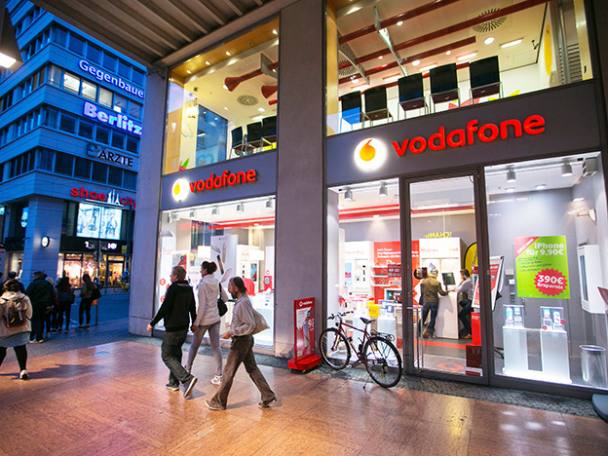Vodafone (VOD) is priced for catastrophe, which – in the world of telecoms investing – means a dividend cut. The share price has fallen 28 per cent since the start of 2018 and currently yields over 8 per cent – a yield so high it should be viewed as a major red flag by income investors. So a dividend cut is a noteworthy risk, especially given that a major acquisition of assets from Liberty Global is expected to lift net debt to to 3.4 times adjusted cash profits (Ebitda) by the year-end, according to broker JPMorgan. What's more, the upcoming auctions for the fifth-generation mobile network (5G) are likely to be expensive.
But unlike many of its European peers, Vodafone has options to bring down its debt without the need to cut the dividend. Performance is also expected to tick up, with growth of 1-5 per cent in adjusted cash profits targeted. And even if management was forced into a volte-face on its dividend policy and trimmed the payment, we think there is still value in the lowly rated shares. After all, the world is in the grips of a data revolution and Vodafone is ideally placed to benefit from that.
Forecast free cash flow growth
Liberty Global deal ernings enhancing
Improving margins
Options for reducing debt
Weakness in Spain and Italy
Risk of dividend cut
Key to Vodafone's expected earnings recovery is an increased use of technology across the portfolio. In a recent investor conference, incoming chief executive Nick Read (who has been finance director for more than four years) estimated that €8bn (£7.2bn) of annual costs can be lowered using digital initiatives. JPMorgan forecasts that this will widen Ebitda margins to 32.6 per cent by 2020, from 29.7 per cent just three years previously.
Meanwhile, the outlook for service revenues is improving, despite short-term weakness (growth fell to 0.3 per cent on a like-for-like basis in the first quarter of 2019, from 1.6 per cent in the prior financial year). Growth has been hampered by intense and unsustainable price competition in Spain and Italy. Management doesn’t expect an imminent recovery here, but strength in the dominant German subsidiary (23 per cent of last year's revenue) and newly reinvigorated domestic market (15 per cent) should offset short-term weakness while prices should recover in Spain and Italy over the medium term.
In Germany, Vodafone’s €18bn deal with Liberty Global in May will give the group greater scope to take on dominant player Deutsche Telecom. Together, Vodafone and Unitymedia – Liberty’s German branch – will have 10 per cent and 14 per cent of the fixed broadband and TV markets, respectively. The deal (which has been partly funded by new mandatory convertible bonds) is expected to be immediately earnings enhancing and boost free cash flows by double digits in the third year after completion.
Overall, recovering revenues and better margins should translate to better cash generation, although management expects free cash flow of €5.2bn in the year to March 2019, which is only down on the €5.4bn generated in the 2018 financial year because of greater expenditure on Vodafone’s ultra-fast broadband initiative in Germany. Over the next three years, free cash flow should total €17bn.
But Vodafone does not include spectrum costs in its free cash flow figures as it argues these are not consistent expenses required to keep the business running. Still, while spectrum spending is far from consistent, peaking at €3.4bn in 2016, but averaging just €1.2bn in the past nine years, it is nevertheless a very real drain on cash. This will especially be the case in 2019 and 2020, when management reckons spectrum costs will average roughly €2bn a year owing to expensive 5G auctions, before dropping back.
Over the three years, expected free cash could then cover the €12bn cost of maintaining the dividend plus €5bn, which means a maintained dividend may not be quite as ludicrous an idea as the current yield suggests. Plus, Vodafone has gone through years of elevated spending before without having to cut the dividend. As the group’s capacity to increase its dividend is determined by long-term performance (rather than cash flows in a particular year), Mr Read is confident the payout can be maintained. The short-term spectrum costs aren’t a dividend issue, but a leverage issue, he insists.
Options to bring down the debt include the sale and leaseback of some of the group’s telecoms towers. This would allow the group to retain ownership of those that are key to its network superiority, but release value from others. Barclays thinks the total value of its European telecoms towers is €12bn. Vodafone is also planning on merging its Australian subsidiary and listing its New Zealand business to release more capital.
| VODAFONE (VOD) | ||||
| ORD PRICE: | 168.9p | MARKET VALUE: | £45.1bn | |
| TOUCH: | 168.8-168.9p | 12-MONTH HIGH: | 240p | 163p |
| FORWARD DIVIDEND YIELD: | 8.3% | FORWARD PE RATIO: | 13 | |
| NET ASSET VALUE: | 253ȼ* | NET DEBT: | 46% | |
| Year to 31 Mar | Turnover (€bn) | Pre-tax profit (€bn) | Earnings per share (ȼ) | Dividend per share (ȼ) |
| 2016 | 55.9 | 2.4 | 7.0 | 14.5 |
| 2017 | 47.6 | 3.3 | 8.0 | 14.8 |
| 2018 | 46.6 | 4.4 | 11.6 | 15.1 |
| 2019** | 44.8 | 4.9 | 13.1 | 15.4 |
| 2020** | 45.3 | 5.4 | 14.1 | 15.7 |
| % change | +1 | +10 | +8 | +2 |
| NMS: | 10,000 | |||
| BETA: | 1.07 | |||
| *Includes intangible assets of €43.3bn, or 162ȼ a share | ||||
**Numis forecasts, adjusted PTP and EPS figures £1=€1.12 | ||||









